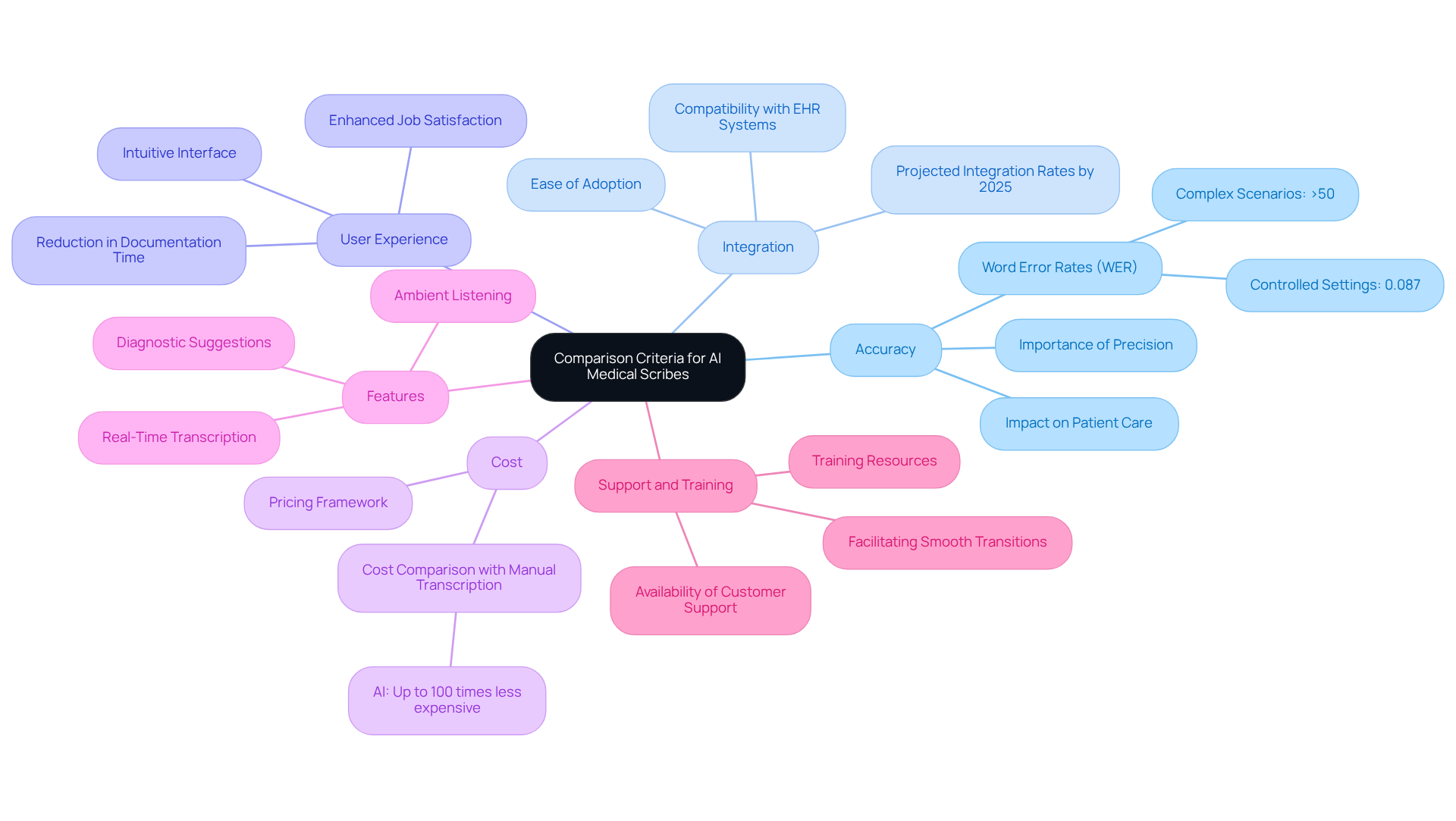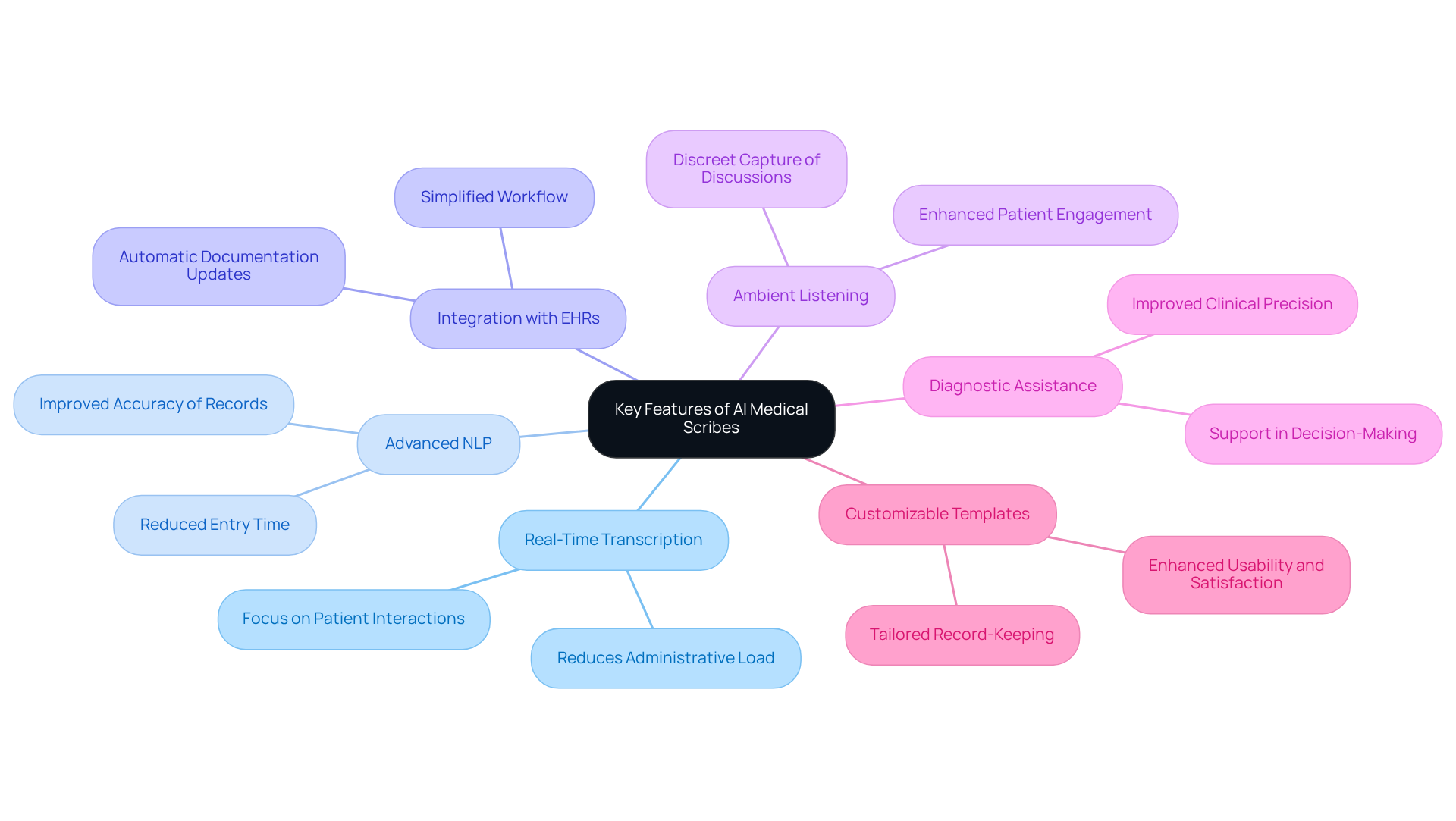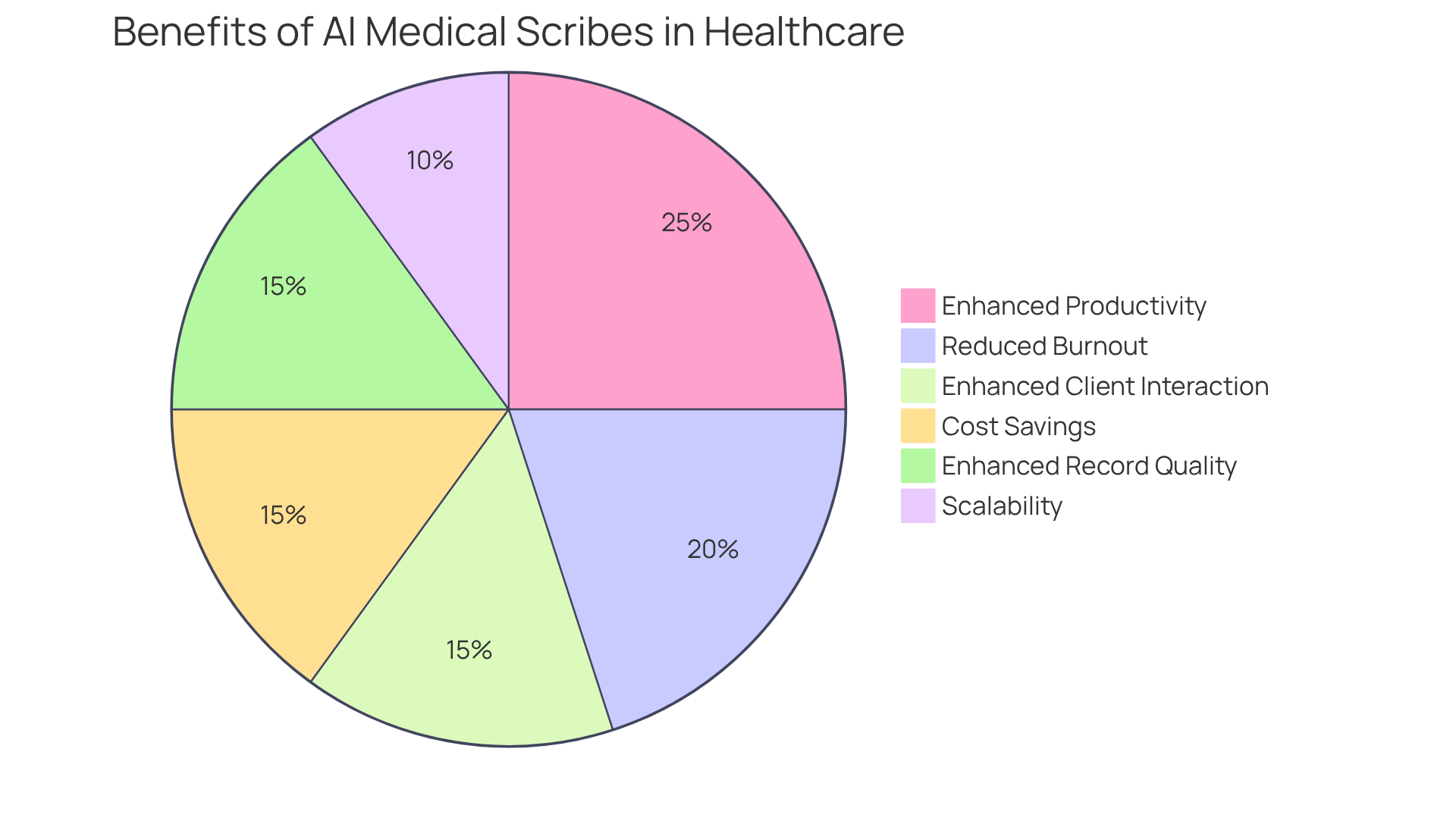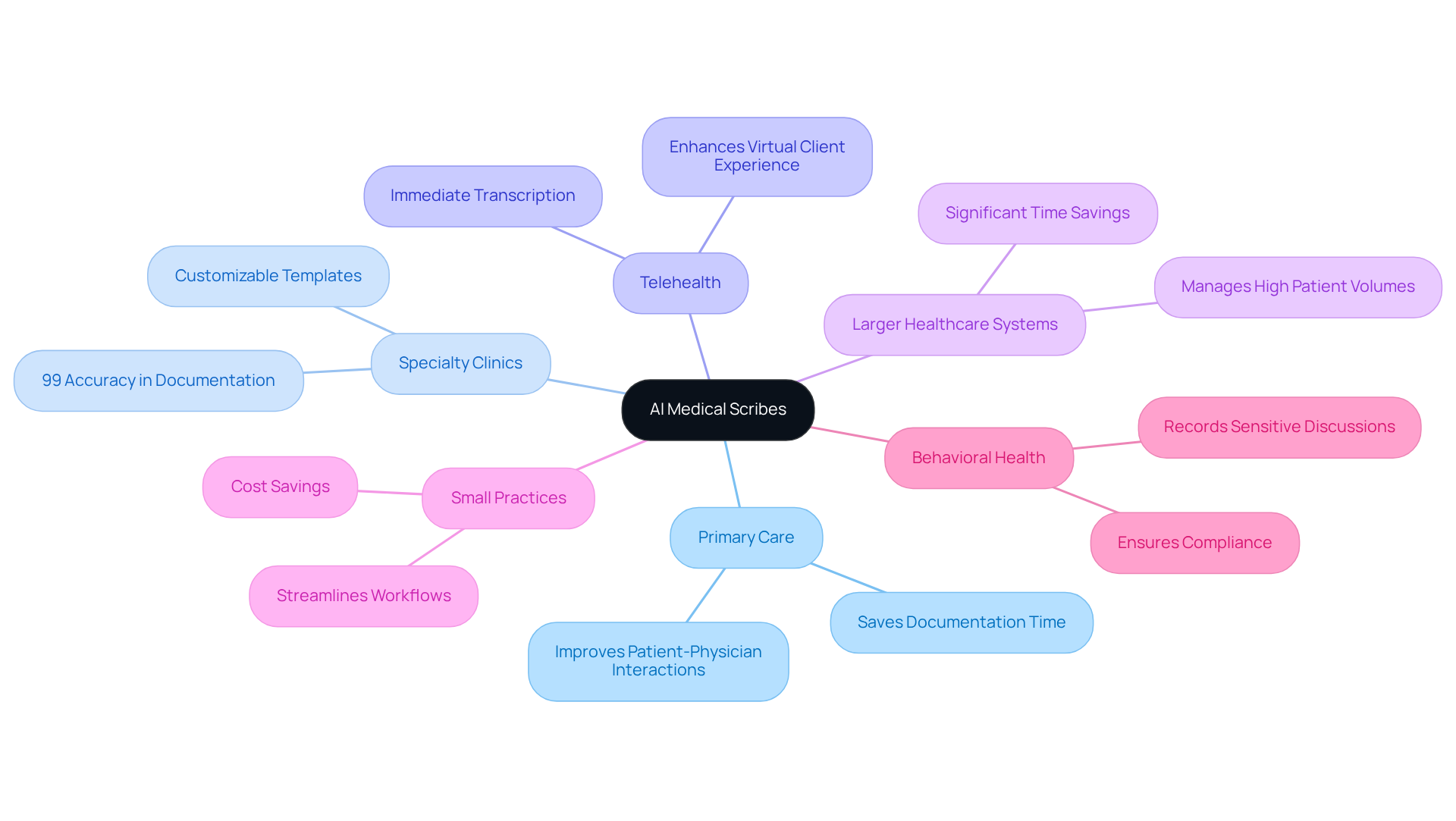Overview
This article highlights the essential features and benefits of AI medical scribes for healthcare providers, focusing on how they can alleviate the emotional and administrative burdens faced daily. Have you ever felt overwhelmed by paperwork? AI medical scribes can enhance efficiency and significantly reduce those burdens, allowing you to concentrate on what truly matters—patient care.
Accuracy and integration with existing systems are crucial. Imagine a world where your notes are captured flawlessly, seamlessly fitting into your workflow. This not only improves patient care but also reduces burnout among clinicians, fostering a healthier work environment.
Cost-effectiveness and additional functionalities further contribute to these benefits. By streamlining processes, AI medical scribes can help you save time and resources, ultimately benefiting both you and your patients. Isn’t it time to explore how these tools can support you in your vital role?
We encourage you to consider the potential of AI medical scribes in your practice. Together, we can enhance patient care and create a more sustainable work-life balance for healthcare providers.
Introduction
The integration of artificial intelligence in healthcare is transforming how providers document patient interactions. However, the selection of an AI medical scribe can feel overwhelming. With so many options available, it's crucial for healthcare providers to understand the key features and benefits that set the best solutions apart.
What criteria should you prioritize to ensure these tools not only streamline operations but also enhance patient care and clinician satisfaction? This article explores the vital aspects of AI medical scribes, shedding light on their advantages and the transformative potential they hold for modern healthcare settings.
Comparison Criteria for AI Medical Scribes
When evaluating the best , it's essential to prioritize several key criteria that truly address the needs of healthcare providers.
- Accuracy is paramount. The precision of AI in transcribing and summarizing client interactions is crucial. High accuracy minimizes the risk of errors in medical records, which is vital for maintaining quality service. Studies show that word error rates (WER) can vary dramatically, from as low as 0.087 in controlled settings to over 50% in complex conversational scenarios. This variability underscores the importance of selecting a solution with proven precision, alleviating physician concerns about the impact on patient care and easing resistance to innovation.
- Integration is another critical factor. Seamless compatibility with existing Electronic Health Records (EHR) systems can significantly optimize workflow. As healthcare providers increasingly embrace AI technologies, integration rates are projected to rise by 2025. Many clinicians are eager for AI tools that enhance their current EHR systems, and effective integration can help ease apprehensions about adopting new technologies, reinforcing the value of AI assistants.
- Consider the User Experience as well. An intuitive interface is vital for healthcare providers to adapt quickly without disrupting their practice. Positive user experiences have been reported, with clinicians noting that efficient AI assistants can greatly reduce documentation time and enhance job satisfaction. This ease of use directly addresses physician concerns about quality care, allowing them to focus more on patient interactions rather than administrative burdens.
- Next, evaluate the Cost. Assessing the pricing framework, including subscription models and potential savings compared to traditional human writers, is essential for budget-conscious practices. AI transcription can be up to 100 times less expensive than manual transcription, making it an appealing option for many providers. By highlighting these cost advantages, AI assistants can present a compelling case for adoption in an environment where cost efficiency is paramount.
- Don't overlook the Features. Additional functionalities, such as real-time transcription, ambient listening, and diagnostic suggestions, can significantly enhance the value of the AI writing assistant. These features not only improve documentation efficiency but also support clinical decision-making, addressing the concerns of physicians who may be hesitant to adopt new technologies.
- Lastly, consider Support and Training. The availability of customer support and training resources is crucial for the successful implementation of AI technology. Effective training can facilitate smoother transitions and better utilization of the AI tool's capabilities, encouraging healthcare providers to embrace these innovative solutions.
In summary, when choosing the best AI medical scribe, healthcare providers should thoughtfully evaluate these criteria. By doing so, they can ensure they select a solution that not only improves their practice but also upholds the high standards of care that their patients deserve.

Key Features of Leading AI Medical Scribes
Healthcare providers often face overwhelming emotional and administrative burdens that can detract from their ability to provide the best care. Leading AI medical scribes are here to help, offering a range of features designed to meet these diverse needs and alleviate some of these challenges:
- Real-Time Transcription: Imagine being able to focus entirely on your patient interactions without the distraction of note-taking. Many AI assistants, such as , provide immediate transcription, allowing clinicians to reclaim precious hours each day. This significantly reduces the administrative load that contributes to burnout.
- Advanced Natural Language Processing (NLP): With cutting-edge NLP capabilities, AI writers understand and handle medical terminology effectively, improving the accuracy of records. A 2022 study showed that AI-assisted record-keeping reduced entry time to an average of 5.1 minutes compared to 8.9 minutes for manual entry, while also decreasing errors per line. This directly addresses the frustrations you may experience in your daily work.
- Integration with EHRs: The best AI medical scribe seamlessly integrates with popular Electronic Health Record (EHR) systems, ensuring that your documentation is automatically updated in real-time. This integration simplifies your workflow and reduces the risk of data entry mistakes, allowing you to focus more on your patients’ wellbeing.
- Ambient Listening: Certain solutions utilize ambient listening technology to capture discussions discreetly, allowing you to maintain eye contact and engage fully with individuals. This enhances the overall experience for both you and your patients, reducing the stress associated with documentation.
- Diagnostic Assistance: The best AI medical scribe can provide diagnostic suggestions based on conversations, supporting you in your decision-making processes. This not only aids in clinical precision but also enriches the quality of your interactions with patients, which is essential for effective service delivery.
- Customizable Templates: You can tailor the AI's output to meet your specific record-keeping needs, enhancing usability and satisfaction. Customization leads to more thorough and organized records, which are vital for efficient patient support and minimizing time spent on administrative tasks.
By incorporating these features, not only do you enhance the precision of your documentation, but you also significantly boost your satisfaction and engagement, addressing the urgent issue of burnout in healthcare. CosmaNeura stands out in the faith-oriented healthcare sector, ensuring that its AI solutions align with Catholic teachings, further enriching the ethical aspects of patient care. How might these tools transform your daily practice and support your commitment to compassionate care?

Benefits of Implementing AI Medical Scribes
Implementing the best AI medical scribe can yield significant benefits for healthcare providers, addressing both their emotional and practical challenges.
- Enhanced Productivity: Imagine a world where healthcare providers can dedicate more time to their patients rather than paperwork. By automating documentation and relieving administrative duties like scheduling and managing medical records, the best AI medical scribe frees up invaluable time. This allows providers to see more individuals and focus on delivering quality care. Research shows that doctors utilizing AI assistants can experience a productivity boost of around 5.8%, enabling a greater patient encounter volume.
- Reduced Burnout: The pressures of administrative tasks can weigh heavily on healthcare providers, leading to increased stress and burnout. With less time spent on these burdens, many report significantly lower levels of stress. For example, Mass General Brigham noted a 40% reduction in burnout among clinicians after implementing AI documentation technology, while MultiCare reported an impressive 63% decrease in burnout and improved work-life balance. By easing the pressures of scheduling, record management, and paperwork, AI assistants help create a healthier work environment.
- Enhanced Client Interaction: How often do healthcare providers wish they could engage more meaningfully with their patients? AI scribes enable deeper engagement between clinicians and individuals, fostering better communication and trust. By alleviating the burden of documentation, providers can focus entirely on patient interactions, enhancing the overall patient experience. This shift towards patient-centered practices is essential in addressing the widespread issues of limited access and rising costs in healthcare.
- Cost Savings: In a time when every dollar counts, AI assistants can significantly lower expenses related to employing human staff, removing costs associated with salaries, benefits, and training. This cost-effectiveness makes the best AI medical scribe a for healthcare practices, enabling them to allocate resources more effectively toward care for individuals.
- Enhanced Record Quality: The precision and uniformity of AI-generated notes lead to improved health outcomes and reduced record errors. Clinicians keep around 80% of AI-generated drafts in their final records, indicating a high level of trust in the quality of AI outputs. This reliability is crucial in a system where documentation errors can create substantial challenges in treating individuals.
- Scalability: As healthcare needs grow, so must the solutions. AI solutions can easily scale with the practice, accommodating growth without the need for additional staffing. This flexibility enables healthcare practitioners to broaden their offerings effectively as client demand rises, addressing the urgent requirement for enhanced access to services in today's healthcare landscape.

Suitability of AI Medical Scribes for Different Practices
AI medical scribes are becoming increasingly valued for their adaptability across various healthcare settings, addressing the emotional challenges faced by providers. In primary care, these practices experience significant benefits from AI assistants, which simplify documentation procedures. This allows providers to dedicate more time to patient care. Imagine saving an hour each day—research indicates that doctors utilizing AI assistants can achieve just that, enhancing their focus on meaningful clinical interactions.
In specialty clinics, AI scribes come equipped with customizable templates tailored to specific medical fields. This level of customization not only improves precision but also , meeting the unique needs of different specialties. For instance, practices like Canyonville Health and Urgent Care have reported an impressive 99% accuracy rate in their records, empowering clinical staff to concentrate on providing care to individuals.
Telehealth providers also find AI assistants particularly beneficial. The immediate transcription and summarization capabilities enhance the virtual client experience, ensuring careful record-keeping that is vital for compliance and fostering positive interactions with clients. How reassuring it is to know that your records are meticulously maintained!
Larger healthcare systems can harness the power of AI assistants to effectively manage high patient volumes, significantly alleviating the administrative burden on staff. Take The Permanente Medical Group, for example, which introduced ambient AI assistants. This innovation has led to over 15,791 hours saved in documentation time—equivalent to 1,794 eight-hour workdays.
Small practices can also reap substantial cost savings and efficiency gains by adopting AI assistants. These tools enable solo practitioners to streamline their workflows, allowing them to focus on delivering quality care without the overwhelming weight of administrative tasks.
In the realm of behavioral health, AI assistants play a crucial role in recording sensitive discussions, ensuring compliance and precision. This capability is essential for maintaining the integrity of client records while fostering a supportive environment for individuals.
Overall, the integration of the best AI medical scribe across these various practices not only enhances documentation accuracy but also significantly improves job satisfaction among healthcare providers. By allowing them to prioritize patient care effectively, we can create a more compassionate healthcare environment for everyone involved.

Conclusion
Selecting the right AI medical scribe can fundamentally transform healthcare practices. It enhances productivity, reduces burnout, and improves patient interactions, addressing the emotional challenges faced by providers. Evaluating key features such as:
- Accuracy
- Integration with EHRs
- User experience
- Cost-effectiveness
- Additional functionalities
is crucial. These elements streamline documentation and empower healthcare providers to focus more on patient care, fostering a more compassionate healthcare environment.
Consider the significant cost savings and efficiency gains that AI medical scribes offer across various healthcare settings. From primary care to specialty clinics and telehealth, these tools cater to the unique needs of providers. They allow for more meaningful interactions with patients, addressing the urgent challenges in today's healthcare landscape. Moreover, the adaptability and scalability of AI solutions make them suitable for practices of all sizes, ensuring that no provider is left behind.
In conclusion, integrating AI medical scribes is not merely a technological advancement; it is a necessary evolution in healthcare that prioritizes quality patient care. As the demand for efficient and effective healthcare solutions continues to grow, embracing these innovative tools is essential for providers looking to enhance their practice and improve overall patient outcomes. Taking the step towards implementing AI medical scribes will alleviate administrative burdens, paving the way for a more patient-centered approach in healthcare delivery. Are you ready to transform your practice for the better?




